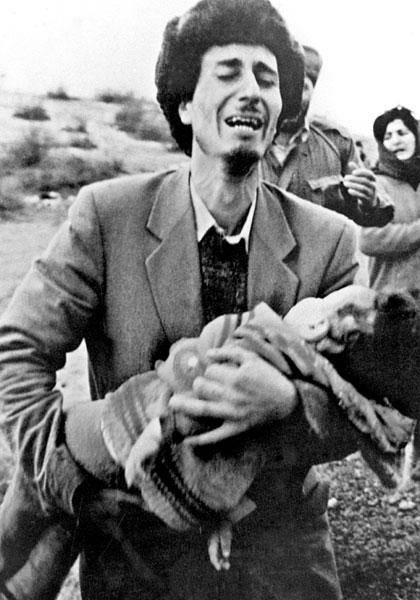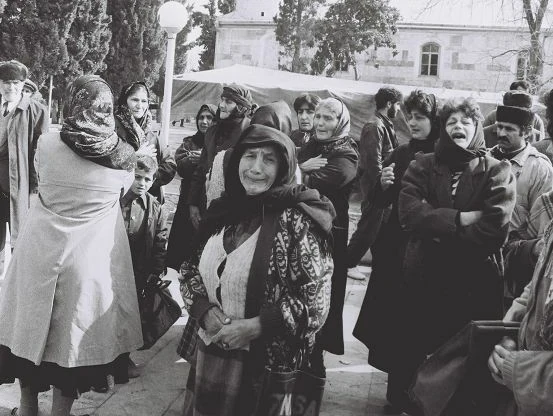People grieving for the massacre of ethnic Azerbaijanis by Armenians in the town of Khojaly, Karabakh, Azerbaijan, February 1992.
The Republic of Azerbaijan reaffirms its commitment to seeking justice and ensuring that such atrocities never occur again
Annually on 26 February, the people of Azerbaijan solemnly commemorate a day that has etched itself into the collective memory of the nation — the anniversary of the Khojaly genocide.
This year marks the 32nd year since the nightmarish events of February 1992 unfolded in the small town of Khojaly, located in the Karabakh region of Azerbaijan. It was on this dark day that Armenian armed forces perpetrated a brutal massacre against the Azerbaijani inhabitants of Khojaly.
The Khojaly genocide stands as one of the 20th century’s most horrendous human tragedies, comparable in its sheer brutality to the massacres of Srebrenica, Khatyn and My Lai.
Before the conflict, more than 7 000 people resided in Khojaly — a town that became the scene of unspeakable violence and the epicentre of Armenia’s decades-long aggression against Azerbaijan. The siege and subsequent attack on Khojaly were part of a calculated occupation policy, which saw the systematic killing and forced expulsion of Azerbaijanis not only from Khojaly but from several other settlements as well.
 A grieving father who has lost his child.
A grieving father who has lost his child.
Within the framework of Armenia’s occupation policy, Azerbaijanis were subjected to particularly brutal killings and massacres in the lead-up to the Khojaly genocide. These atrocities took place in various settlements including Baganis Ayrim, Garadagli, Meshali, Karkijahan, Malibeyli, and Garadaghli, highlighting a pattern of violence and aggression.
From October 1991, the town of Khojaly was surrounded by Armenia’s armed forces. Some months later, over the night of 25-26 February 1992, following massive artillery bombardment, Armenia’s armed forces with the help of the former USSR’s 366th Motorized Rifle Regiment, mostly comprising Armenians, occupied the Azerbaijani town of Khojaly in the Karabakh region of Azerbaijan and committed a mass annihilation of Azerbaijanis living in that town.
At least 613 people, including 63 children, 106 women and 70 elderly citizens, were brutally murdered. 1 275 were captured, taken hostage and tortured, and 487 were injured. The fate of 150 of those captured, including 68 women and 26 children, remains unknown. The actions of the Armenian armed forces tore families apart — eight families were completely wiped out — 130 children lost one parent and 25 children lost both parents.
The Khojaly genocide was a manifestation of the longstanding policy of ethnic animosity, racial prejudice, and aggression that Armenia has directed against Azerbaijan at a governmental level over an extended period.
The Khojaly genocide and other crimes committed by Armenia during its aggression against the Republic of Azerbaijan, including war crimes and crimes against humanity, represent grave breaches of international laws on human rights and humanitarian standards. Such breaches encompass violations of the Convention on the Prevention and Punishment of the Crime of Genocide; the Convention against Torture and Other Cruel, Inhuman or Degrading Treatment or Punishment; the International Convention on the Elimination of All Forms of Racial Discrimination and others.
The international community has not remained silent on this tragedy: 18 countries and 24 states of the USA, along with organisations such as the Organization of Islamic Cooperation and the Organization of Turkic States, have passed resolutions condemning the Khojaly massacre as a crime against humanity and an act of genocide.
In its judgement of 22 April 2010, the European Court of Human Rights arrived at an important conclusion regarding the crimes committed in Khojaly, denouncing the behaviour of those who carryied out the atrocities as “acts of particular gravity which may amount to war crimes or crimes against humanity”.
 Survivors of Khojaly genocide arriving in Aghdam.
Survivors of Khojaly genocide arriving in Aghdam.
International law mandates that states are obligated to conduct investigations into atrocities like the ones carried out by Armenian forces in Khojaly and to bring those responsible to justice. Yet, despite the clear evidence and international condemnation, the perpetrators of the Khojaly genocide have not been held accountable by Armenia.
Throughout the military operations from 27 September to 10 November 2020, the Armenian forces persistently engaged in the intentional targeting of Azerbaijani civilians. In a strategy mirroring the terror tactics previously employed in 1992, Armenian military actions were directed at civilian areas and infrastructure within Azerbaijani cities including Ganja, Barda, and Terter, which are located at a considerable distance from the war zone. Utilising multiple launch rocket systems and cluster munitions during this period, Armenian forces once more illegitimately aimed at and caused the deaths of innocent Azerbaijani civilians.
After the local counter-terrorism measures undertaken by the armed forces of Azerbaijan on 19-20 September 2023 to prevent further military provocations and terror acts of the illegal Armenian armed forces within its sovereign territory, Azerbaijan ensured full disarmament and withdrawal of all illegal armed formations and disbandment of the puppet regime in the Karabakh region of Azerbaijan. Subsequently, the arrest and detention of criminals responsible for acts of war and genocide against the Azerbaijani people have marked a significant step towards achieving justice and ending impunity for crimes committed during the conflict.
As the people of Azerbaijan remember the victims of the Khojaly tragedy, the Republic of Azerbaijan reaffirms its commitment to seeking justice and ensuring that such atrocities never occur again. The memory of those lost in Khojaly is enshrined in Azerbaijan’s national consciousness as the solemn reminder of the cost of conflict and the enduring strength of the Azerbaijani spirit.